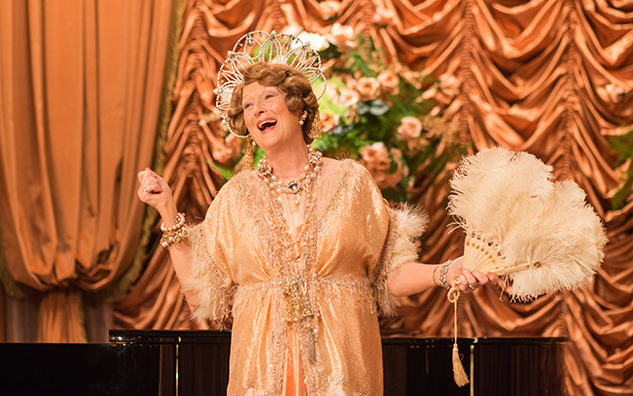Sing when you’re winning.
It opens in New York, 1944, and we’re informed that it’s a true story. The Verdi Club, named after the Italian opera composer Giuseppe Verdi, is in full swing. A man captivates the audience with a soliloquy from Shakespeare’s Hamlet, despite his lacklustre delivery. He introduces the next act, Florence Foster Jenkins (Meryl Streep), and fawns over her. The audience applauds generously, although the performance that follows isn’t very good. Foster Jenkins emerges from backstage to accept adulation and flowers. She’s the founder of the Verdi Club. She thanks her husband, St. Clair Bayfield (Hugh Grant). He takes her homes, puts her to bed, kisses her on the cheek, then catches a cab to Brooklyn where another woman greets him and tells him that she loves him. This is how we’re introduced to Stephen Frears’ Florence Foster Jenkins.
She was an opera singer notorious for her lack of talent, fuelled by an enormous enthusiasm for music and unwarranted self-belief and supported by an enormous inheritance. She’s deluded, but she’s also rich, which can be a formidable combination. An early rehearsal scene is a masterclass in bad singing. I would say that you couldn’t sing worse if you tried, but there it is. The film follows Foster Jenkins in the final act of her life, as she readies herself for a performance in Carnegie Hall. She can afford it because if you’re rich enough you can pretty much do whatever you like.
Are the people around Foster Jenkins letting her remain ignorant in the name of her passion for music or is it an unhealthy indulgence in egotism? It could be a bit of both. Either way, I may never be able to listen to the ‘Queen of the Night Aria’ from The Magic Flute the same way again. It’s cant be easy to sing badly without making it seem like you’re trying to sing badly, but Streep has managed it. By all accounts, Florence Foster Jenkins was as atrocious as she’s depicted in this film. Aware of her detractors but never mindful of them, she famous declared: “People may say I can’t sing, but no one can ever say I didn’t sing.”
Foster Jenkins may be the centrepiece of Frear’s film but Grant’s Bayfield is the mastermind behind her success. He’s an actor, he explains to Foster Jenkin’s accompanist Cosmé McMoon (Simon Helberg), but would never be a great one, and so he accepts Foster Jenkins’ generosity readily. But she needs him just as much as he needs her, if her fantasy is to continue. He bribes reviewers, screens audiences members, flatters her constantly and organises her life so that her bubble never pops.
He appears to feel genuine affection toward Foster Jenkins but then perhaps he’s just extraordinarily patient and knows how best to handle her. He has that other woman in Brooklyn, and he claims Foster Jenkins knows about her, but to what extent? Foster Jenkins is a willing accomplice in her ignorance. Hugh Grant’s performance may just be his best to date. Behind that particular brand of charm and refinement that’s he’s built a career on, there’s warmth I’ve never seen from him before.
Frears’ film is either a celebration of passion or a judgment on Florence Jenkins’ ignorance. I’m inclined to believe it’s the former, because of the way in which Frears’ narrative and characters regard her. But there’s ugliness in Foster Jenkins self-indulgence that’s difficult to ignore. It’s not easy to engage favourably with a character that lack this degree of self-awareness. I wasn’t happy for Foster Jenkins during her realisation of her Carnegie Hall dream, because she neither earns the honour nor deserves it. Her generosity toward others was the consequence of her wanting to sustain her own silliness. The film is however, a charming reminder that people all over the world are living eccentric lives right under our noses.
7/10
For more Reviews, click here. If you’re digging ReelGood, sign up to our mailing list for exclusive content, early reviews and chances to win big!

